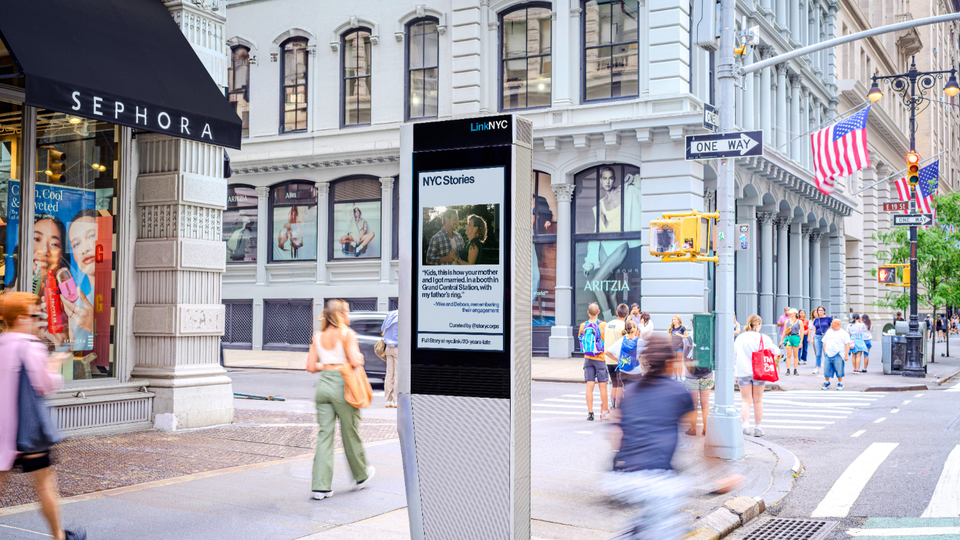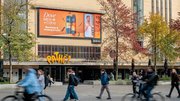Content
NYC bus driver reacts to being featured in recent StoryCorps, LinkNYC digital signage campaign
StoryCorps, a non-profit aiming to preserve and promote stories of regular Americans, recently partnered with LinkNYC in a "NYC Stories" campaign featuring native New Yorkers that ran across the city. Digital Signage Today interviewed one of the featured NYC bus drivers, Frank de Jesus, for more.

October 1, 2024 by Daniel Brown — Editor, Networld Media Group
StoryCorps, a non-profit aiming to preserve and promote stories of regular Americans, recently partnered with LinkNYC in a "NYC Stories" campaign featuring native New Yorkers that ran across the city.
As reported in Digital Signage Today, the campaign was run throughout the LinkNYC network of kiosks, which combine smart kiosk solutions with digital signage and DOOH technologies.
The campaign featured stories such as that of Frank de Jesus, a New York City bus driver who recounted the challenges and triumphs of serving his community through the pandemic. De Jesus' story has also appeared on NPR, where he shared the motivation and camaraderie among his fellow drivers, saying: "You know, once you are against the wall, the only way you can go is forward."
We reached out to De Jesus via email interview to dig deeper into his reaction on being featured in the digital signage campaign.
Q&A with Frank de Jesus
Q: Could you briefly introduce yourself and your work for our readers who haven't seen the ad campaign yet?
De Jesus: Yes, my name is Frank de Jesus. I am a bus operator for MTA New York City Transit. I also do union organizing in my capacity as a shop steward at my depot.
Q: How did you get involved with the StoryCorps project, including the NPR broadcast and the more recent NYC digital signage content campaign that featured your story?
De Jesus: In January 2020, just a month or so before Covid began, a coworker of mine, Tyrone Hampton, was featured in a story about a young kid on the spectrum who he noticed was lost on his bus. He noticed the kid was distraught and called for assistance, thus getting the kid to his parents. During the height of Covid, StoryCorps got wind of this story and asked Tyrone for an interview with another bus operator, and he contacted me to join him. At the time, I was highly involved in getting PPE for bus operators at our depots and doing my best at keeping our coworkers as safe and informed as possible. We tried to make the interview a feel-good story, as we didn't want to add to the gloom our brothers and sisters were going through. It turned out to be a moment I cherish deeply. Especially since Mr. Hampton has since passed away. As for the digital signage, I believe LinkNYC asked StoryCorps for a story, and our story was chosen.
Truly grateful for this as well.
Q: How do you feel about your story reaching a broader audience across NYC during this digital signage campaign?
De Jesus: My story reaching a broader audience is pretty cool. I've had a lot of people reach out to me and tell me they saw me throughout the city. Besides driving the bus, I work as a union steward. I communicate with a lot of fellow bus operators daily, and they were really excited to see me on the screens. They joke that now I'm famous.
Q: How did your father's work as a bus driver shape your own career choices and love of the profession? And what does it mean to have "a driver's heart?"
De Jesus: My father is a person with deep dedication to whatever endeavors he takes on. He always took driving very seriously. He would tell me this machine is not only a means of transportation, but if not used with care, it can cause a lot of harm and seriously injure people. He taught me things like to respect the vehicle you are driving, and that if you do so, you will avoid catastrophe.
These conversations made me grow a respect for driving that turned into a passion. When you have these things combined with a love for providing a service to the people of NYC, you have something we can call a "driver's heart."
Q: How has your work changed during and after the COVID lockdown days, and has this changed your feelings about the job at all?
De Jesus: The job is getting back to normal, and the city is pretty much back to where it was back in the day. The only thing that has changed is the way we view ourselves. During Covid, for the first time in a long time, bus operators were seen with a different lens. While the people of NYC have always had respect for us, the city officials had many times pitted themselves against NYC drivers, whether it be because of labor contract disputes or because of slew of other reasons. But during Covid, we saw how much they actually needed us. The NYC transit system never shut down. We stayed running buses and trains 24/7 and got the essential workers to and from work daily. WE WERE TRULY ESSENTIAL [de Jesus' emphasis] to keep the city running, and we should never forget that.
Q: One of the tragedies of the pandemic was the loss of NYC drivers to the virus. How would you describe their memory and legacy?
De Jesus: The NYC Transit agency lost the most workers of any government agency in the country. I truly wish we had a day to commemorate their sacrifice for our city. Every day we all went out and prayed we didn't get infected. It took a psychological toll on us all. But we did it bravely and courageously. We are proud of every single bus operator who worked during those times. We proved how essential we are to the city of New York.
Q: Can you briefly tell our readers about your friend with the caution tape who worked to create safe distance between drivers and passengers?
De Jesus: It takes a special kind of person to take action sometimes. And my friend Michael is a person I saw act with this kind of mindset many times to do what was best for his brothers and sisters. One afternoon while I was getting a car wash near his depot I caught a glimpse of him. At this time, Transit was hesitant on what actions to take to protect us from the virus because they didn't want to cause panic with the customers. But he took a stand and put our safety first. He took a roll of caution tape and taped off the seat behind the bus driver on every bus that approached the bus stop. Later that day, we made an announcement to have our fellow brothers and sisters help do this throughout the system, and they did. It was a feat of camaraderie that forced Transit to implement a policy mimicking this just about a week later. A great victory for the bus operators!
Q: What was the biggest lesson you took away from these experiences in NYC during the pandemic? How would you describe your relationship with the city coming out of these years of difficulty?
De Jesus: My biggest takeaway is just how resilient New York City is. It was truly a mesmerizing view to be able to stand in the middle of 2nd Avenue and not see a single other person anywhere nearby. It's something we probably will never experience again. But here we are a few years later, and everything is back to normal. It shows that you should never give up. You should always march forward. Times get tough, but you have to be tougher. NYC is tough. And while we might not show it all the time, most of us really appreciate each other. We should show it more, I guess.
Q: What has been the biggest challenge of your work, and just to contrast that, what has been the greatest joy?
De Jesus: I really don't consider my work challenging. When you enjoy what you do, you learn to make it a game. Sometimes you lose, but when you're good at it, most times you win. Not to say it isn't difficult, because it is a mentally and sometimes physically taxing job. Constantly being vigilant for all the incoming information you are processing while maneuvering the streets of Manhattan or any other borough. Or just the difficult times the economy has placed everyone in. We must always remember how blessed we are to just be alive. I believe in optimism — look for the solution, don't dwell on the problem. The joy comes from knowing that things can be worse, but there is always a possibility that they can also be better if you strive for it.
Related:
'You never bet against NYC, because NYC always comes back'
About Daniel Brown
Daniel Brown is the editor of Digital Signage Today, a contributing editor for Automation & Self-Service, and an accomplished writer and multimedia content producer with extensive experience covering technology and business. His work has appeared in a range of business and technology publications, including interviews with eminent business leaders, inventors and technologists. He has written extensively on AI and the integration of technology and business strategy with empathy and the human touch. Brown is the author of two novels and a podcaster. His previous experience includes IT work at an Ivy League research institution, education and business consulting, and retail sales and management.
 ChatGPT
ChatGPT Grok
Grok Perplexity
Perplexity Claude
Claude






